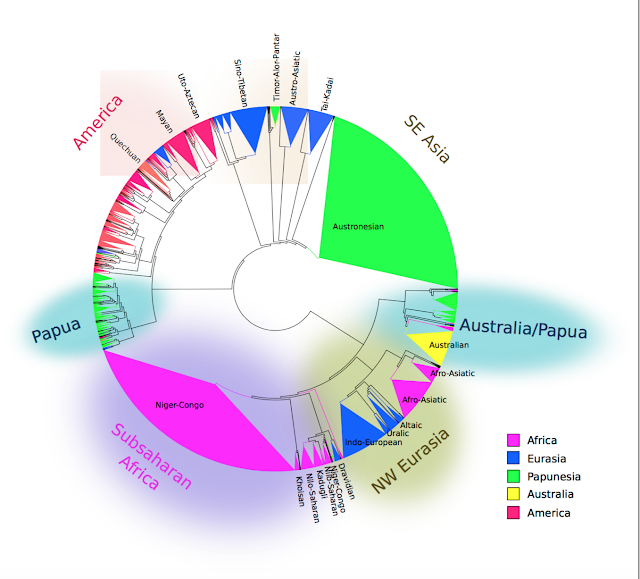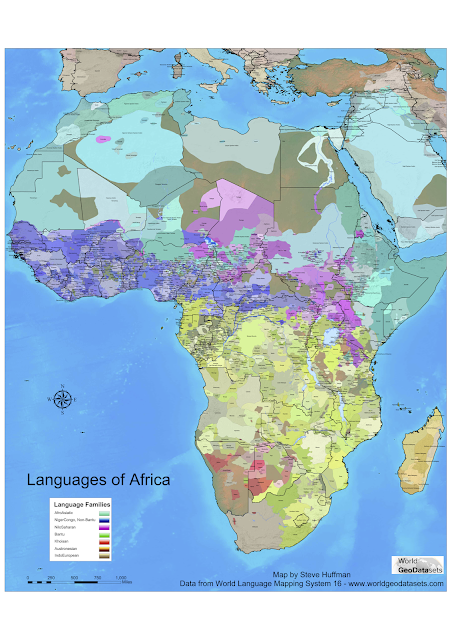Brust, breast, borst: an encounter with r-metathesis
Two months ago I gave birth to our second daughter. In order to prepare for this joyous event, I prepared by trying to get some of the local (German) vocabulary on labour & babies in my head. One of the words I had some trouble with was Brust 'breast'. Basically, my German reading is pretty decent, but speaking and writing are another matter, I just don't have enough vocabulary at the ready, hence my quest. Until now I could get away with blaming my high school education, where I suffered from a then new policy to split up second language education in a compulsory reading module and an optional speaking & writing module that I did not take. Having lived in Germany for over two years now, it's getting rather embarrassing though.
Anyway, back to Brust. The reason I found it confusing is that compared to my native Dutch, the r is in the wrong place: in Dutch it's borst 'breast'. Hmm. English breast has the r in the same place as German though. Then when I was brushing my teeth one night, I realised borstel 'brush' in Dutch looks a lot like Bürste 'brush' in German, and also to the English form brush, now with English having the r in the 'wrong' place. What's going on here?
This phenomenon is called metathesis, when sounds or syllables in a word or, when dealing with sentences, words in a sentence, change their order. Specifically we are dealing with r-metathesis here, the position of r has been changed to come after the vowel in Dutch borst 'breast' - as for brush, we'll come to that. This is a really common type of sound change, and many examples are given on a wikipedia page here.
In the words for 'breast', it's Dutch borst that's the odd one out: all the Germanic forms have the br cluster and go back to Proto-Germanic *breust-, *brusti- 'breast', which ultimately goes back to Proto-Indo-European *bhreus-, *bhreu-, with meanings ranging from 'breast' to 'belly' (see here). The only exception is West Frisian boarst 'breast', from Old Frisian briast, brast - one can only imagine this instance of r-metathesis must have occurred under pressure from Dutch.
As for the words for 'brush', turns out they are not all related. English brush is a loanword from Old French broisse, while Dutch borstel and German Bürste come from the Proto-Germanic form *burstila-, a diminutive of *burst 'bristle'. These forms come from a word meaning something like the hair that sticks up on certain animals, as brushes used to be maid from wiry animal hair. Actually, the Dutch and German words are related to English bristle, where it's actually English that has undergone the r-metathesis (see here and here).
Just as a bonus, another word I learned and was confusing too, but because of very different reasons, is Kreißsaal. kreißen is a verb meaning 'to labor', and saal means 'room', so together it's 'delivery room'. My immediate association though is with the cognate Dutch verb krijsen 'scream, screech', so for me Kreißsaal translates to 'screaming room'! When I explained this to native German speakers they seemed rather surprised at this. Turns out the verb kreißen seems rather uncommon in contemporary German ('only' 36.700 hits on Google). One of my friends told me her only association of the first part of the word was with Kreis 'circle', and she thought that for some reason, all delivery rooms were circular well into adulthood.
So far for baby-related adventures in German, I promise to talk about grammar next time.
Anyway, back to Brust. The reason I found it confusing is that compared to my native Dutch, the r is in the wrong place: in Dutch it's borst 'breast'. Hmm. English breast has the r in the same place as German though. Then when I was brushing my teeth one night, I realised borstel 'brush' in Dutch looks a lot like Bürste 'brush' in German, and also to the English form brush, now with English having the r in the 'wrong' place. What's going on here?
Food items that look like breasts, no. 1
This phenomenon is called metathesis, when sounds or syllables in a word or, when dealing with sentences, words in a sentence, change their order. Specifically we are dealing with r-metathesis here, the position of r has been changed to come after the vowel in Dutch borst 'breast' - as for brush, we'll come to that. This is a really common type of sound change, and many examples are given on a wikipedia page here.
In the words for 'breast', it's Dutch borst that's the odd one out: all the Germanic forms have the br cluster and go back to Proto-Germanic *breust-, *brusti- 'breast', which ultimately goes back to Proto-Indo-European *bhreus-, *bhreu-, with meanings ranging from 'breast' to 'belly' (see here). The only exception is West Frisian boarst 'breast', from Old Frisian briast, brast - one can only imagine this instance of r-metathesis must have occurred under pressure from Dutch.
Food items that look like breasts, no. 2
As for the words for 'brush', turns out they are not all related. English brush is a loanword from Old French broisse, while Dutch borstel and German Bürste come from the Proto-Germanic form *burstila-, a diminutive of *burst 'bristle'. These forms come from a word meaning something like the hair that sticks up on certain animals, as brushes used to be maid from wiry animal hair. Actually, the Dutch and German words are related to English bristle, where it's actually English that has undergone the r-metathesis (see here and here).
Just as a bonus, another word I learned and was confusing too, but because of very different reasons, is Kreißsaal. kreißen is a verb meaning 'to labor', and saal means 'room', so together it's 'delivery room'. My immediate association though is with the cognate Dutch verb krijsen 'scream, screech', so for me Kreißsaal translates to 'screaming room'! When I explained this to native German speakers they seemed rather surprised at this. Turns out the verb kreißen seems rather uncommon in contemporary German ('only' 36.700 hits on Google). One of my friends told me her only association of the first part of the word was with Kreis 'circle', and she thought that for some reason, all delivery rooms were circular well into adulthood.
So far for baby-related adventures in German, I promise to talk about grammar next time.
Food items that look like breasts, no. 3






Native speaker of German here. Yup, Kreiß- is a cran morpheme in the contemporary language, occurring in Kreißsaal and nowhere else.
ReplyDeleteThe ß shows it can't be cognate with krijsen, though. I bet the German cognate of that is kreischen "to screech". Is there any krijt- or kreit- in Dutch?
Hi! Thanks! You are right - krijten is listed as a probable earlier form of kristen (here: http://www.etymologiebank.nl/trefwoord/krijsen), which is cognate with German kreischen, with the same meaning. It's funny though that kreißen and kreischen are so similar; the wiktionary page for Eng. cry gives them all as cognate: https://en.wiktionary.org/wiki/cry
Delete